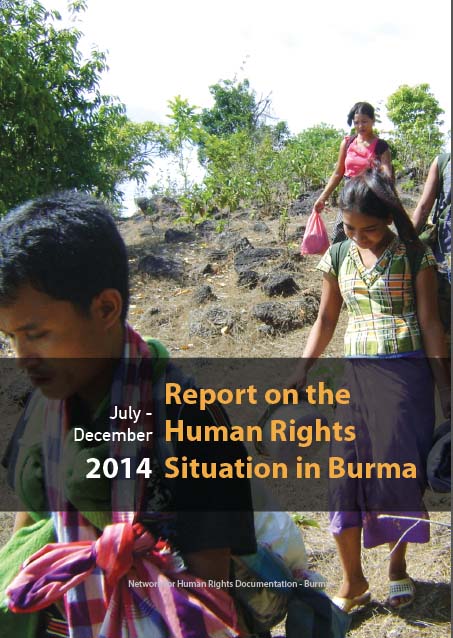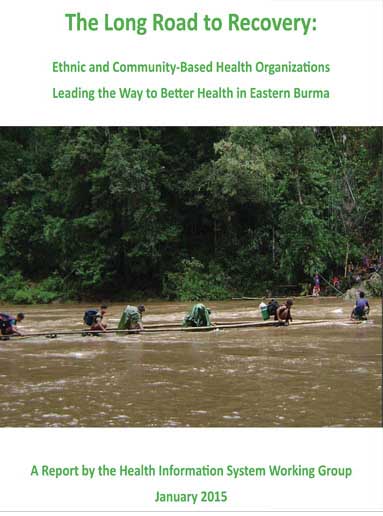Ethnic Nationalities (252 found)
Political Reform and Ethnic Peace in Burma/Myanmar: The Need for Clarity and Achievement
For many citizens a countdown begins to a crucial general election later this year, with warnings of a halt in reform momentum and a more troubling reality behind many of the socio-political changes in the country […]
• • •Mong Ton Villagers Protest Against Salween Dam at Consultation Meeting
About 150 local villagers protested against the planned Upper Salween (Mong Ton) dam during a consultation organized by Australia’s Snowy Mountain Engineering Corporation (SMEC) in Mong Ton, southern Shan State, Burma on April 6, 2015 […]
• • •Statement by Local People of Mong Ton Township, Shan State
Regarding the Environmental Impact Assessment (EIA) and Social Impact Assessment (SIA) for the Upper Salween (Mong Ton) hydropower project, which will involve building a dam and electricity generating plant on the middle section of the Salween River, 19 kilometers from Wan Sala village, the people of Mong Ton township have the following opinions: […]
• • •The Rohingya, the Citizenship Law, Temporary Registration, and Implementation of the Rakhine State Action Plan
In February 2015 around a million people, ethnic Rohingya lost their right to vote in Burma’s upcoming election. The British government said nothing about the massive blow both to the rights of the Rohingya and the credibility of the election. The British government is still talking about the election as a critical moment in Burma’s transition to democracy […]
• • •HRC28, Item 4 : Interactive Dialogue with the UN Special Rapporteur on the Situation of Human Rights in Burma/Myanmar, Ms. Yanghee Lee
8th Regular Session of the UN Human Rights Council Oral Statement Delivered by Khin Ohmar on behalf of Asian Forum for Human Rights and Development (FORUM-ASIA) […]
• • •Statement by Ms Yanghee Lee, Special Rapporteur on the Situation of Human Rights in Myanmar at the 28th Session of the Human Rights Council
I thank you for this opportunity to address the Human Rights Council for the first time, at a pivotal time in the reform process in Myanmar.
• • •New report by Network for Human Rights Documentation – Burma Details Continuing Human Rights Violations by Burmese Military against its Citizens
 ND-Burma has published its periodic report covering the second-mid period of 2014 and focuses on 107 documented cases of human rights violations in Burma from July to December 2014. The violations documented during these six months occurred in areas of armed conflict but also in areas covered by ceasefires.
ND-Burma has published its periodic report covering the second-mid period of 2014 and focuses on 107 documented cases of human rights violations in Burma from July to December 2014. The violations documented during these six months occurred in areas of armed conflict but also in areas covered by ceasefires.
ND-Burma’s findings demonstrate that, despite progress in reaching ceasefire agreements with non-state armed groups, the government has made little progress protecting the human rights of its citizens. Furthermore, continued arrests of human rights defenders demonstrate that the government is not serious about working with civil society to protect human rights […]
• • •Advance Unedited Version: Report of the Special Rapporteur on the situation of human rights in Myanmar, Yanghee LEE
Since 2011, Myanmar has undergone far-reaching changes that have affected many aspects of life in the country. However, there continue to be signs of backtracking by the Government and increasing concerns over discrimination and ethnic conflict […]
• • •Amnesty International Annual Report – Myanmar Chapter
Despite ongoing political, legal and economic reforms, progress on human rights stalled, with some backward steps in key areas. The situation of the Rohingya deteriorated, with ongoing discrimination in law and practice exacerbated by a dire humanitarian situation. Anti-Muslim violence persisted, with the authorities failing to hold suspected perpetrators to account. Reports of abuses of international human rights and humanitarian law in areas of armed conflict persisted. Freedoms of expression and peaceful assembly remained severely restricted, with scores of human rights defenders, journalists and political activists arrested and imprisoned. Impunity persisted for past crimes […]
• • •The Long Road to Recovery: Ethnic and Community-based Health Organizations Leading the Way to Better Health in Eastern Burma
 A new report, based on the first large-scale health survey in eastern Burma since recent ceasefires, shows some improved health indicators, linked to programming of local ethnic health providers, but highlights that sustained improvements to the overall health of conflict-affected communities remain dependent on the peace and reform process, and may take decades […]
A new report, based on the first large-scale health survey in eastern Burma since recent ceasefires, shows some improved health indicators, linked to programming of local ethnic health providers, but highlights that sustained improvements to the overall health of conflict-affected communities remain dependent on the peace and reform process, and may take decades […]

 All posts
All posts